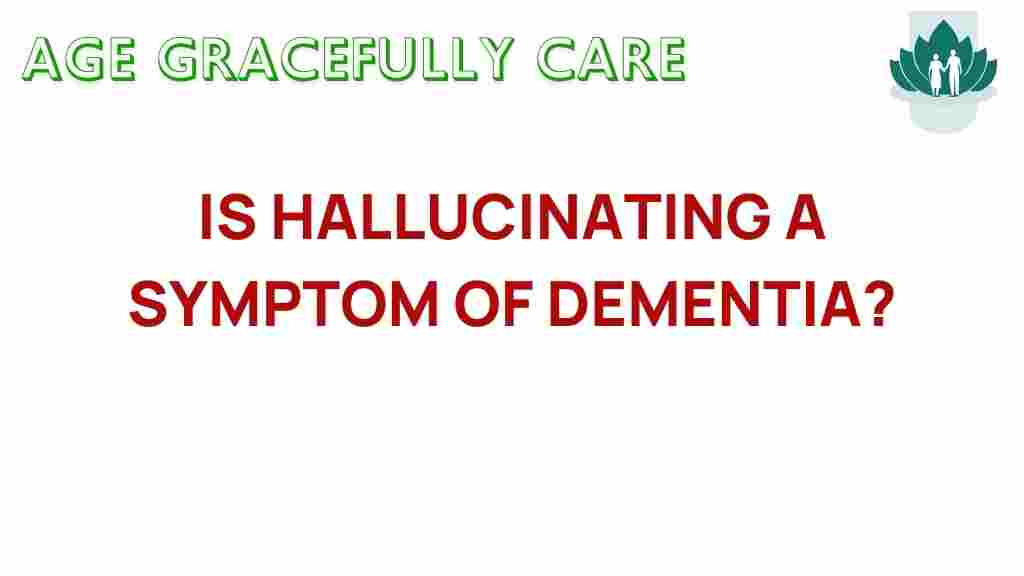Is Hallucinating a Hidden Symptom of Dementia?
Dementia is a term that describes a range of neurological disorders affecting cognitive function, including memory, thinking, and social abilities. As the population ages, the prevalence of dementia and its associated symptoms, such as hallucinations, becomes a pressing concern. Understanding the relationship between dementia and hallucinations is crucial for caregivers and families of the elderly. In this article, we will delve into the truth about hallucinations in the context of dementia, exploring symptoms, causes, and treatment options while raising awareness about this significant health issue.
Understanding Dementia and Its Symptoms
Dementia encompasses various conditions, with Alzheimer’s disease being the most common type. The symptoms of dementia can vary widely but generally include:
- Memory loss
- Difficulty in communication
- Disorientation and confusion
- Changes in mood and personality
- Difficulty performing familiar tasks
As cognitive decline progresses, some individuals with dementia may also experience hallucinations. Hallucinations are sensory experiences that appear real but are created by the mind. They can occur in various forms, including:
- Visual hallucinations (seeing things that aren’t there)
- Auditory hallucinations (hearing voices or sounds that don’t exist)
- Olfactory or tactile hallucinations (smelling or feeling things that aren’t present)
Can Hallucinations Indicate Dementia?
Hallucinations are not universally recognized as a primary symptom of dementia, but they can occur in certain types of dementia, particularly in the later stages. Here are some key points to consider:
- Alzheimer’s Disease: While primarily characterized by memory loss and cognitive decline, some individuals may experience visual hallucinations as the disease progresses.
- Lewy Body Dementia: This type of dementia is characterized by prominent visual hallucinations, often occurring early in the disease’s progression.
- Frontotemporal Dementia: Individuals may experience changes in personality and behavior, which can include hallucinations.
Understanding these nuances is vital for caregivers in elderly care settings, as recognizing hallucinations can lead to more effective management strategies.
Causes of Hallucinations in Dementia
The causes of hallucinations in individuals with dementia can be multifactorial:
- Cognitive Decline: As dementia progresses, the brain undergoes significant changes that can lead to misinterpretations of sensory stimuli.
- Medication: Certain medications used to treat dementia or related symptoms may contribute to hallucinations.
- Environmental Factors: Changes in surroundings, such as unfamiliar settings or poor lighting, can trigger hallucinations.
- Emotional Distress: Anxiety, depression, or fear can exacerbate hallucinations in individuals with dementia.
Recognizing Hallucinations in Dementia
Awareness of the symptoms of hallucinations is essential for caregivers and families. Here are some signs to look out for:
- Sudden changes in behavior, such as confusion or agitation
- Reports of seeing or hearing things that others do not
- Increased anxiety or fear without apparent cause
- Difficulty distinguishing between reality and hallucinations
Step-by-Step Process to Address Hallucinations
If you suspect that a loved one with dementia is experiencing hallucinations, it is essential to follow a structured approach:
1. Assess the Situation
Take note of when and where hallucinations occur. Are they triggered by specific situations or environments?
2. Stay Calm
Respond to the individual with compassion and understanding. Avoid arguing or correcting them, as this can increase distress.
3. Create a Safe Environment
Ensure that the living space is familiar and well-lit. Reducing shadows and eliminating clutter can help minimize confusion.
4. Consult a Healthcare Professional
Schedule an appointment with a doctor or neurologist specializing in dementia. They can assess the situation and provide guidance on treatment.
5. Review Medications
If the person is on medication, discuss potential side effects with the healthcare provider to determine if adjustments are necessary.
Troubleshooting Tips for Caregivers
Here are some additional tips for caregivers to manage hallucinations in individuals with dementia:
- Maintain a Routine: Establishing a consistent daily schedule can provide stability and reduce anxiety.
- Engage in Activities: Providing engaging activities can distract from hallucinations and promote cognitive function.
- Use Reassurance: Offer comfort and reassurance, reminding the individual that they are safe and cared for.
- Document Incidents: Keep a record of hallucination episodes, noting triggers and responses. This information can be valuable for healthcare providers.
Final Thoughts on Dementia and Hallucinations
Hallucinations can be a hidden symptom of dementia that significantly affects the quality of life for both individuals and caregivers. By increasing awareness of this phenomenon, we can better prepare to address it through effective communication, environmental adjustments, and professional guidance. Understanding the complexities of dementia, including its associated symptoms, is vital for providing quality elderly care.
For those dealing with dementia-related hallucinations, seeking support is paramount. Resources such as support groups and educational materials can be beneficial. Consider exploring this resource for further information on managing dementia symptoms and enhancing mental health.
In conclusion, while hallucinations may not be the most recognized symptom of dementia, they are an important aspect that deserves attention. By fostering awareness and understanding, we can improve the lives of those affected by dementia and their families.
For more information on neurological disorders and mental health, please visit this external link.
This article is in the category Health and created by AgeGracefullyCare Team
